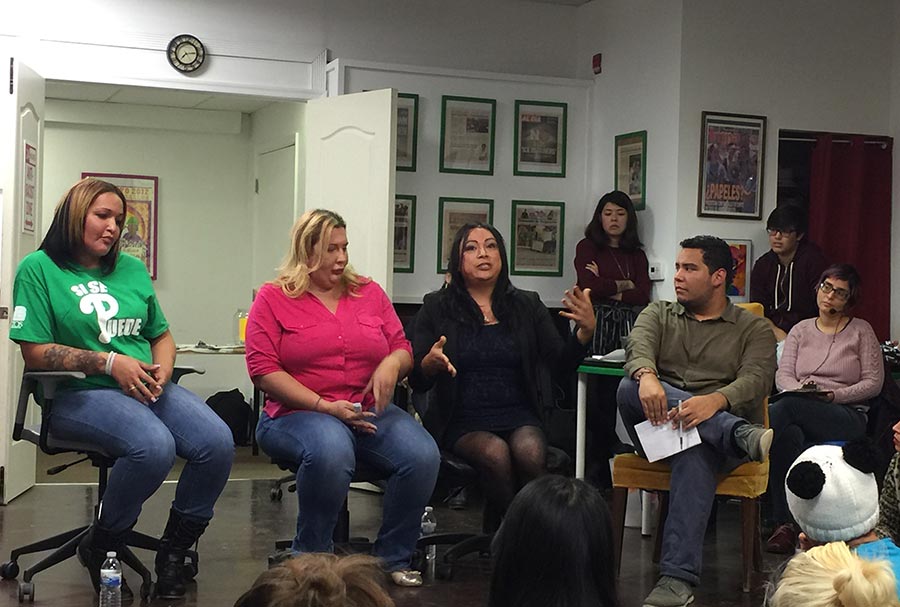Jennicet Gutiérrez, a trans Latina activist, said she interrupted President Barack Obama at an LGBT Pride ceremony over the summer because she was tired of waiting for him to address the detainment of undocumented LGBT immigrants.
“All of us have a role to play in liberation,” she told a crowd of about 60 gathered Nov. 13 at Juntos in South Philadelphia. “Assimilation is only going to benefit the few and it’s going to continue to oppress the most marginalized among us.”
Gutiérrez spoke on a panel with Deja Lynn Alvarez, the trans* leadership counselor at GALAEI: A Queer Latin@ Social Justice Organization, and Naiymah Sanchez, the Trans-Health Information Project coordinator at GALAEI. Miguel Andrade, a Juntos leader and vice president of the GALAEI board, moderated.
The women discussed what got them into activism and the concept of liberation for about 25 minutes before responding to questions from the audience for about 40 minutes. The event was in Spanish and English.
“We have to talk about the LGBT community and the undocumented community together because we’re all siblings,” said Erika Almiron, executive director of Juntos, a Latino human-rights organization. Her organization partnered with GALAEI to present the panel.
Elicia Gonzales, executive director of GALAEI, said she was happy to see so many people come out to the discussion.
“It goes to show how important this event is and how much of a fan-girl club exists around Jennicet,” she said.
A wide range of people attended, from college- and high school-aged kids to parents with children. State Rep. Brian Sims, Pennsylvania’s first elected openly gay state lawmaker, came to the event, as did Nellie Fitzpatrick, director of the Philadelphia Office of LGBT Affairs.
Gutiérrez, who lives in Los Angeles and works with Familia: Trans* Queer Liberation Movement, said one woman from the Not One More campaign to end deportation stood with her when she interrupted the president. She had an idea about why the other 300 guests shushed and booed her.
The Human Rights Campaign had invested millions in legal fees over at least a decade to pursue marriage equality, Gutiérrez said, noting the timing of her interruption came just days before the U.S. Supreme Court legalized same-sex marriage nationwide.
“Unfortunately, marriage is not a priority for trans women of color,” she said. “Survival is our priority.”
Before Gutiérrez began speaking, she asked audience members to join her for a moment of silence in honor of the more than 20 trans women of color who have been murdered this year and all the undocumented people being held in detention centers.
At first, Alvarez said she didn’t understand why someone was heckling the president at a Pride event. She said she had to watch Gutiérrez’s interruption several times before the gravity of the incident sunk in.
“No one was speaking out for my trans sister although every person in that room claimed to be an activist or an advocate of some sort,” she said.
Alvarez said she realized she didn’t always have to work within certain restraints in order to advocate for the community.
Sanchez shared her own experience working with local police for training sessions on how to treat transgender people and eliminate prison rape. She heard from a sergeant that when gay or transgender inmates claim they have been raped, prison officials assume they are merely causing a scene for attention. Frustrated with this assumption, Sanchez turned to the police captain, who called for increased training for all new cadets.
Alvarez, who works with the Philadelphia Police Department, said new officers have two-hour training sessions on LGBT sensitivity before they can start patrolling the streets. She works closely with Deputy Commissioner Kevin Bethel, the outgoing police LGBT liaison.
“Twenty years ago, I was beat up and arrested for no reason by the cops,” Alvarez said. “Now I have a direct line to the deputy commissioner of police. When the police act up, I don’t have to go in and file a complaint. I pick up my phone and I dial the deputy commissioner and say, ‘This is what I need.’”
“It’s helping,” she said.

